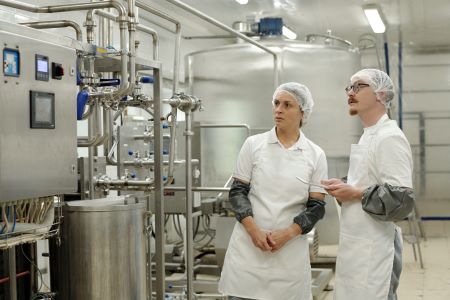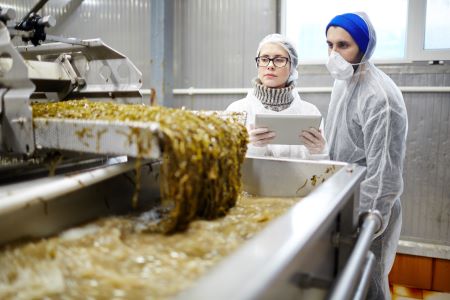Canada’s agrifood sector is trailing leading international competitors in number of companies and investment
 Canada’s agrifood sector lags behind leading countries in both concentration of companies and total investment funding, according to a new report by the Canadian Food Innovation Network (CFIN).
Canada’s agrifood sector lags behind leading countries in both concentration of companies and total investment funding, according to a new report by the Canadian Food Innovation Network (CFIN).
The report leverages foodtech data intelligence from Forward Fooding, a global foodtech ecosystem platform, and provides an extensive review of over 9,950 global companies and 320 Canadian companies.
Canada’s food system is responsible for Cdn$150 billion (around seven percent) of national GDP and employs roughly 2.3 million Canadians. When measuring for total economic value, only 10 countries produce more food than Canada.
“Canada’s foodtech ecosystem has made remarkable progress over the last decade, driving transformative innovations that enhance sustainability, boost economic productivity, and create jobs nationwide,” Dana McCauley, CEO of CFIN, said in a statement.
“However, to truly realize our potential as a global foodtech superpower, we must address the pressing challenges that remain.”
For example, when it comes to investment, with US$2.9 billion raised by over 320 companies since 2014, Canada ranks 10th in company count and 13th in total investment, the report says.
Canada’s ag-tech sector has received 44 percent of total investments since 2014 – substantially higher than the global average of 17 percent.
In contrast, Canadian foodtech companies, which account for 75 percent of the country’s total agrifood tech sector, have secured only 56 percent of investments since 2014.
This is in stark contrast to the global trend where foodtech attracts over 83 percent of funding – placing Canada 19th globally.
Between 2018 and 2024, Canada's foodtech sector attracted US$1.6 billion in total investments, significantly less than in the U.K. (US$8.8 billion) and the U.S. (US$86.6 billion), despite showing similar investment trends peaking in 2022.
Within Canada's foodtech industry (excluding ag-tech), the plant-based protein sector dominates, accounting for 25 percent of active companies, well above the global average of 14 percent.
This sector is followed by the functional foods and drinks sector (12 percent) and biotech/synthetization (seven percent).
Plant-based proteins, biotech-enabled functional ingredients, and upcycled ingredients and food waste are Canada’s strongest foodtech domains. The country has gained a larger share of global investments since 2021 within these sub-clusters, according to the report.
Canada’s plant-based sector, valued at US$1.7 billion in 2023, comprises 25 percent of the country’s foodtech companies, largely driven by business-to-business (B2B) innovation in functional ingredients.
Canada currently features 60+ startup and scaleup companies operating in the plant-based sector developing meat, fish and dairy alternatives as well as other plant-based functional ingredients.
The sector is driven by substantial investments from companies like Burcon NutraScience and Roquette, along with over Cdn$150 million from the federally funded Protein Industries Canada global innovation cluster to support scalable, sustainable protein production.
Strategic collaborations across the value chain, such as Roquette’s pea and fava initiatives and the Cdn$16-million Daiya Foods initiative to develop cheese alternatives using Canadian-grown pulses, emphasize Canada’s role in advancing plant-based innovation.
Government and industry support are helping to drive accessibility and innovation in plant-based products, crucial for strengthening Canada’s domestic and export position in the sector, the report says.
“Substantial investment into plant-based innovation has positioned the country as a global co-manufacturing hub, but challenges like high production costs, retail prices, and sensory qualities remain key limiting factors to market growth.”
Limited private capital investment is a problem
Despite robust public support, Canada's foodtech industry faces challenges due to limited private capital, the report notes.
Venture capital backs only 40 percent of foodtech rounds (compared with 60 percent in the U.K. and U.S.), while public grants constitute nearly 30 percent of total funding in Canada, far exceeding the U.K. (five percent) and U.S. (eight percent).
Canadian foodtech startups lack the funding necessary to scale effectively, the report says. For Canadian foodtech startups, venture capital round sizes for pre-seed and seed rounds align with those in the U.K. and U.S. at early stages. But Series A and B rounds are about half, and Series C rounds are only one-third of those in the U.S.
This poses challenges for Canadian foodtech companies in accessing the growth capital required to scale effectively.
The functional food and beverage market in Canada is projected to reach US$19.2 billion by 2026, the report says. However, lengthy regulatory approvals and high development costs for biotech ingredients pose considerable barriers to innovation.
Canada's “bio-foodtech” ecosystem, while still in its early stages, is showing significant growth and innovation potential.
Combining advancements in synthetic biology, precision fermentation and health-centred ingredient production, this cutting-edge foodtech cluster represents a key growth area that aligns with many of Canada’s pre-existing strengths.
The sector’s growth is supported by government funding and initiatives, such as the $2.2 billion life sciences investment and Strategic Innovation Fund projects targeting sustainable protein and biotech ingredient development.
This bio-foodtech sub-sector includes innovative companies like Solar Biotech, Mara Renewables, and Chinova Bioworks, which are advancing precision fermentation, clean-label ingredients and DHA-rich omega-3s for diverse food applications.
Other key players, such as Renaissance BioScience and Ardra Bio, are utilizing synthetic biology to enhance food safety, develop renewable specialty chemicals, and produce sustainable alternatives, further positioning Canada as a hub for bio-foodtech innovation.
Canada's bio-foodtech sector faces challenges including lengthy regulatory approvals, high development costs for biotech ingredients, and limited access to infrastructure. However, programs like Protein Industries Canada and CFIA’s streamlined, free approval process offer some support.
 Upcycled ingredients and food waste reduction also offer key opportunities to tackle sustainability challenges within Canada’s food system, the report says.
Upcycled ingredients and food waste reduction also offer key opportunities to tackle sustainability challenges within Canada’s food system, the report says.
By transforming food waste and other agrifood byproducts into valuable ingredients and products, this sector has a nearly unparalleled potential for combining positive environmental benefits with economic growth, according to the report.
Canada produces over 21 million tonnes of food waste annually. The food processing and manufacturing sector produces 49 percent of that total, and households another 15 percent.
Food waste is the consequence of tremendous inefficiencies throughout the food system, highlighting a critical need for innovation to reduce waste and associated emissions.
However, scaling food waste upcycling solutions continues to be a significant challenge in Canada, the report says.
High equipment costs, inconsistent raw material supply, regulatory hurdles and consumer hesitancy are among the key barriers facing innovators in this space.
Only 34 percent of Canadians are familiar with upcycled foods and many are concerned about quality and safety.
Despite these challenges, Canada is home to a growing number of innovative food waste and upcycling foodtech companies. Established companies like Crush Dynamics, Comet Bio, Flashfood, and LOOP Mission are advancing upcycling innovations by transforming food and agricultural by-products into valuable ingredients, consumer goods, and environmental benefits. Their advancements in upcycling manufacturing and product development are helping to drive consumer acceptance and awareness of upcycled foods, while creating new potential revenue streams for operators throughout the food value chain.
The Canadian government supports food waste reduction through initiatives like the $20-million Food Waste Reduction Challenge. Non-profits and social enterprises such as Food Banks Canada and Second Harvest are leveraging foodtech software from the likes of Knead Technologies to recover and redistribute surplus food more efficiently – significantly reducing waste while bolstering food security initiatives.
“Broad demand for solutions across all food system stakeholders has spurred a wave of innovative startups focused on food waste and upcycling,” the report says.
Recommendations to address key gaps and challenges
The report recommends addressing these key gaps and challenges:
- Smart government funding initiatives and the strategic development of a foodtech ecosystem can cultivate an innovation-friendly business environment. This will help Canada’s food sector attract attention from institutional investors, both domestically and internationally, and will increasingly provide scale-up opportunities that are often missing for Canadian foodtech innovators.
- Addressing productivity, labour, and supply chain challenges through technology adoption is essential. Targeted funding programs and building collaboration opportunities between SMEs and foodtech providers can accelerate tech adoption rates, helping close productivity gaps and improve resilience against rising input costs and labour shortages.
- A more supportive and streamlined national regulatory environment would foster innovation and competitiveness. Harmonizing regulations across provinces and territories, particularly those relating to food packaging, labelling, and health claims, would allow companies to shift resources from compliance to innovation and growth, thus encouraging the adoption of new technologies and accelerated commercialization of innovative products.
- Canada can also leverage its existing position as an innovation leader in plant-based proteins, functional foods, upcycled ingredients, and food waste solutions to attract global investment while advancing its domestic food system sustainability goals.
With strengths like access to high-quality agrifood inputs, expertise in developing alternative proteins, a strong network of research and innovation hubs, and government-backed programs supporting foodtech startups and infrastructure, Canada’s foodtech ecosystem has begun to generate meaningful impact, the report says.
Canada is now positioned as a leader in emerging trends such as plant-based proteins, biotech innovations, sustainable packaging and the adoption of AI and automation in food operations.
“Despite this progress, critical gaps remain throughout the ecosystem.”
Concludes the report: “By fostering stronger collaboration among stakeholders, encouraging targeted investment, and streamlining regulatory pathways, Canada can drive transformative change in its food sector and solidify its role as a global leader in sustainable food innovation.”
R$
| Organizations: | |
| People: | |
| Topics: |
Events For Leaders in
Science, Tech, Innovation, and Policy
Discuss and learn from those in the know at our virtual and in-person events.
See Upcoming Events
You have 0 free articles remaining.
Don't miss out - start your free trial today.
Start your FREE trial Already a member? Log in
By using this website, you agree to our use of cookies. We use cookies to provide you with a great experience and to help our website run effectively in accordance with our Privacy Policy and Terms of Service.




